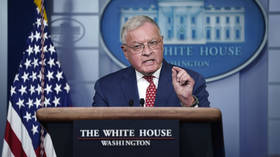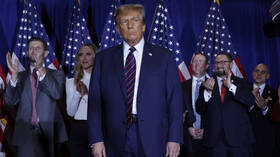‘Turbocharging’ exodus: US beats trade war drums to remove supply chains out of China
The US wants to сut industrial and supply dependence on China amid rising tensions between the two powers. However, not everyone is eager to pack their bags and leave the lucrative Chinese market in the midst of the previous row.
The Trump administration has long been pushing American firms to get back to US soil, especially when trade tensions were flaring between the two biggest global economies. Now the US has revived the trade war rhetoric again.
“We’ve been working on [reducing the reliance of our supply chains in China] over the last few years but we are now turbo-charging that initiative,” Under Secretary for Economic Growth, Energy and the Environment at the US State Department Keith Krach told Reuters.
Krach as well as other officials told the agency that some critical and essential manufacturing should be moved from the country, and the government may take steps on it soon. Apart from the US’ seemingly favorite options of tariffs and sanctions, the plans may include tax incentives and potential reshoring subsidies as well as closer relations with Taiwan – a move which has always angered Beijing.
Washington is also mulling the creation of what one of the officials called ‘Economic Prosperity Network’ which would include companies and groups from some “trusted partners.” The network is set to share the same standards “on everything from digital business, energy and infrastructure to research, trade, education and commerce.”
China’s vital role in global supply chains was felt sharply amid the coronavirus pandemic as many international giants – from tech to car industries – are reliant on the country. The pandemic has forced some US companies to seriously consider at least partial relocation and changing supply chain strategy, according to one of the latest polls conducted by the American Chamber of Commerce in China and its sister organization in Shanghai. However, the majority of firms said that the outbreak does push them to turn their backs on China.
Nevertheless, one of the “China hawks” told Reuters that the virus created “a perfect storm” as it “crystallised all the worries that people have had about doing business with China” and the damages from Covid-19 have eclipsed possible profits.
Also on rt.com ‘No mass exodus’: Most US firms don’t want to wind down operations in China over pandemicWhen the trade war showed no signs of abating last year and the US and China were still hitting each other with tariffs, another AmCham poll showed that the punitive measures were hurting US businesses operating in China. While over forty percent of the 250 respondents were “considering or have relocated” production facilities outside China, some 35 percent of companies said they would rather source within China and target the domestic market. Fewer than six percent wanted to move or already shifted their factory operations to the US.
Set aside the enormous relocation costs – which the White House has recently pledged to cover should an American company decide to ditch China – there is still another massive hurdle in this plan. China is still the world’s top producer of rare earth metals – the group of elements vital for production of multiple devices, from cell phones to some advanced military gear. Should all the production be moved from China, it could ban exports of these materials. Last year Chinese media said the option was already being mulled by Beijing, and it could consider the drastic measure again if trade war tensions further escalate.
For more stories on economy & finance visit RT's business section














